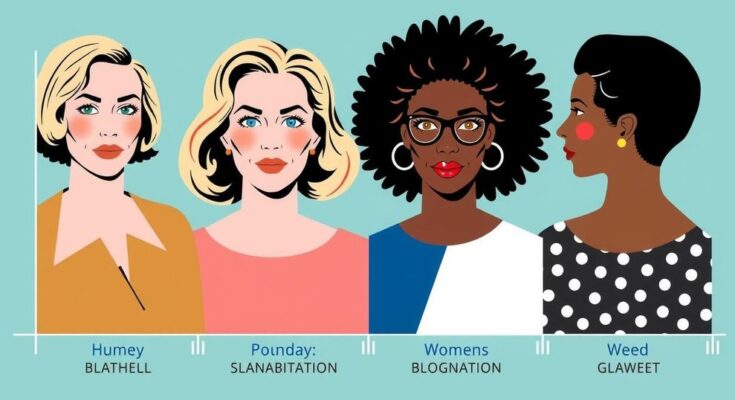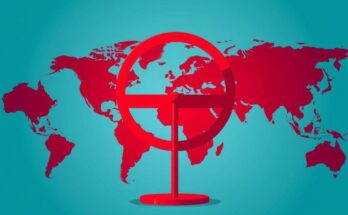In 2024, major elections across the globe resulted in the lowest growth of female political representation in 20 years, with nearly two-thirds of analyzed countries electing fewer women. While some nations saw advancements due to gender quotas and political will, significant barriers such as ambition gaps, financial challenges, and systemic discrimination remain. Advocating for gender equality in politics is essential for fair governance and improving national outcomes.
The year 2024 marked a significant event on the global political stage, with approximately half of the world’s population participating in major elections. However, this period also witnessed a detrimental trend in the growth of female representation in governance, marking the slowest increase in two decades. According to a report from the Inter-Parliamentary Union (IPU), of the 46 countries analyzed, nearly two-thirds experienced a reduction in the number of women elected to their parliaments, a concerning statistic that highlights persistent gender disparities in political representation.
Among the nations witnessing setbacks, the United States, Portugal, Pakistan, India, Indonesia, and South Africa are notable examples, as they saw declines in the proportion of women in their legislative bodies. Furthermore, for the first time in its history, the European Parliament elected fewer women than before. Despite some advancements in countries like the United Kingdom, Mongolia, Jordan, and the Dominican Republic—along with Mexico and Namibia electing their first female presidents—the overall progress for women in political roles was negligible, totaling merely a 0.03% growth.
Mariana Duarte Mutzenberg from the IPU characterized the situation as indicative of “fragile” progress within certain democracies. Concerningly, the Pacific Islands now hold the lowest percentage of female parliamentarians at only 8%. While globally, women constitute 27% of parliamentary positions, there are only thirteen countries nearing parity at the 50% mark, with Latin America and parts of Africa emerging as leaders in female representation.
Sustained advancements in several nations can be attributed to gender quotas. For instance, Mongolia improved its female representation from 10% to 25% following the implementation of a 30% candidate quota for women. Analysis also indicates that countries employing quotas tend to elect a higher proportion of women—averaging 29%—compared to 21% in those without such provisions. Political determination has proven essential; Mexico achieved gender parity in its legislature in 2018 due to a commitment from former President Andrés Manuel López Obrador.
Despite these advancements, disparities persist, particularly in ministerial positions where female representation remains alarmingly low. Women are often relegated to specific roles associated with social issues, missing opportunities to lead key sectors such as finance and defense, as noted by Julie Ballington from UN Women. Various systemic challenges continue to hinder women’s political ambitions, including an ambition gender gap, financial obstacles in running for office, and an absence of supportive infrastructure within parliaments, such as maternity leave.
The mode of electoral systems significantly influences outcomes, with countries that utilize proportional representation achieving better results for women. However, current socio-political climates entail threats to women in politics, with increased instances of gender-based violence and targeted disinformation campaigns exacerbating fears among potential female candidates. There exists a rise in backlash against women’s empowerment, particularly in regions like South Korea, where emerging anti-gender sentiments among young male voters may also discourage female political participation.
A balanced representation not only fosters fairness but is crucial for enhancing national economies and improving policy outcomes. Research indicates that diverse, gender-balanced groups are more effective in decision-making and lead to greater profitability in corporate governance. Including women in peace negotiations correlates with lasting and sustainable results, reinforcing the necessity for women’s voices in all levels of governance.
As stated by Julie Ballington, it is essential to shift the narrative around women in politics by recognizing that the issue is not merely the under-representation of women, but rather the over-representation of men.
The topic of women’s representation in political systems globally has gained increasing importance, especially in light of recent electoral cycles where major elections were held across several countries. Literature indicates that women’s participation in politics has historically faced various barriers, including societal norms, lack of financial resources, and inadequate support structures. While notable progress has been made in specific regions through the implementation of gender quotas and political will, the recent trends observed in the 2024 elections signal stagnation or regression in women’s political representation in numerous key democracies. This backdrop sets the stage for discussing the significance of gender representation in legislatures and governance and its implications for societal development and equality.
In summary, the 2024 elections revealed a troubling trend in the lack of growth in female political representation globally, indicating a stagnation in a process that was previously gaining momentum. While some countries have achieved notable advancements, the overall decline in representation signals deep-rooted systemic challenges that must be addressed to encourage women’s political engagement. Understanding the barriers and advocating for protective measures such as gender quotas could rejuvenate efforts toward achieving gender parity in political representation, ultimately benefiting societal governance and decision-making structures.
Original Source: www.bbc.com




